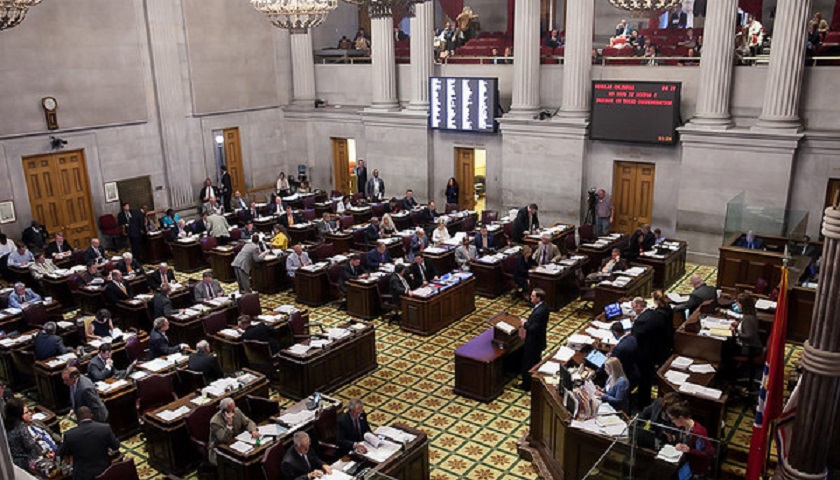by Jeff Hartline
May 8, 2017
As is the habit of the Tennessee General Assembly, the last days of each year’s session are tortured with the approval of the State Budget, one Constitutional requirement that must be completed prior to adjournment. There probably aren’t a thousand regular citizens in the state (out of over 6,800,000) who understand the process, much less the details that lie therein.
The vast percentage of those who do understand the current process reside inside the offices of the Executive Branch of the State, also known as the Governor’s office and the staffs that serve the House and Senate Finance Committees and the Fiscal Review Committee. On the surface, one would conclude that this distribution between the Executive and Legislative branches fulfills the intent of “Separation of Powers”.
It doesn’t.
As one can imagine, the people employed in the Governor’s office are “full-timers”, employees of the State of Tennessee, spending all their time executing the desires and demands of the Governor. Those specifically tasked to budget items give full attention to the nooks and crannies of the budget process and the budget itself. In the same way, the Legislative Committee staffs do the same thing. Because their tasks connect, they are in constant contact with each other, creating an environment that allows them to accomplish their tasks with the least amount of friction and effort.
Add to this equation that budget matters in the House must pass through the Finance subcommittee first, comprised of twelve members, a fraction of the entire body. By the time the Budget comes before the full House and Senate, it has been meticulously sewn together by these groups and presented as a fait accompli by the “full-timers”.
For whatever reason (and we believe we know that reason), the Legislature ceded the Budget responsibility to the Executive Branch years ago. (It is common to hear Members discussing the fact that the Governor is bringing “his budget”.) These days, the members of the General Assembly wait to be told what they will be voting to spend money on during the last days of session, praying that there will be limited debate and they can open up their campaign finance accounts once again and continue running for re-election.
This is the normal procedure.
Except for this year. On the heels of a fractious gas and diesel tax increase debate and the apparent squandering of billions of overpaid sales taxes, the status quo quickly turned into a coup.
Despite their claims of “There was no deal!”, the Governor and Establishment Republicans in House Leadership forgot to set up the Democrat Education Slush Fund they promised in return for Democrat support of the gas tax. They were richly repaid by an embarrassing coalition of Conservative Republicans and spurned Democrats proving just what kind of sham the budget process has become. Rather than just swallowing the work of the “full-timers”, they brought their own ideas about how Tennessee’s money should be spent to the floor of the House, sending the “welchers” into a panic and reminding the Governor that the “part-timers” still have the only votes up on the Hill. Yes, they eventually approved a budget, but not before exercising their rights of representation and showing that the “part-timers” are actually in charge, when they want to be.
(By the way, looking at the budget here, you can see why lawmakers want to “pass the budget, so they can see what is in it.” Go ahead. Read all three documents. We dare you.)
Tennessee has taken pride in the fact that its legislators are “part-timers”. That is, they only come to Nashville in January and leave in May to return to their “real” jobs or “real” lives. (If you believe these folks are “part-timers”, I’ve got some beach-front property in Sevierville for sale.) In the Tennessee Legislature, “serving” is tantamount to “running”, for re-election and all over their districts.
House Members stand for re-election every two years and are constantly raising money and making themselves available to constituents for campaigning purposes. As a result, they are always attending various County Party meetings, Service Club functions, Chambers of Commerce meetings, school events, community fundraising activities, et al. They are responding to requests from constituents for various needs. They are invited for private meetings with district constituency groups to discuss requested legislation or for pressure to be applied in certain areas. Though the Senate Members run every four years, they are doing the same sorts of things with perhaps less direct constant campaigning.
These jobs are not “part-time”. Unless one is a Committee Chairman or a Member of Leadership, each Member has but one Legislative Assistant who attends the phone, responding to requests for meetings, sending messages along to their Member, and otherwise maintaining the District Calendar and official social media platforms. Yes, they are available to study legislation, discuss bills with their Member and ask questions about amendments, but they are just one person.
Contrast that with the “full-timers” who work for the Executive Branch year-round. They have no other responsibility but to understand, craft, and manipulate budget issues. And there are many of them. They report to one person, not 68,000. These Executive Branch “full-timers” are able to communicate with the Legislative “full-timers” year-round. They are responsible for a process that leads to a conclusion. The ingredients that lead to that conclusion cannot be absorbed by “part-time” legislators busy doing hundreds of other things. These “part-timers” must rely on their colleagues who serve on various finance committees. But, remember, they are “part-timers” too.
Even before Session begins, each Member is bringing potential legislation to be crafted by the legal teams in the Capitol. They spend hours seeking out co-sponsors, arguing the relative merits of their bills and debating with Leadership about whether to even bring such legislation to the full Body.
Each Member is assigned to three committees/subcommittees and, as a result, must familiarize themselves with the hundreds of bills coming before those committees. After a few weeks of “getting to know you”, the process of working 2,000 pieces of legislation through this process begins with an expectation that such a process can be accomplished in twelve weeks. (In logical circles, we call this trying to make a square circle.)
Even with a “bill filing deadline”, bills are “rolled” by their sponsors because they are not ready to present and defend them, thus stacking up the committee calendars to ridiculous heights during April. The pace becomes worse than frantic. Add the constant flow of amendments “making the bill” and you have the recipe for what the budget process has become. What’s worse, while committee calendars stack up with over 100 bills to be considered, lawmakers are told that the budget will be up for consideration and must be passed so Session can be adjourned.
If one just had to consider the policy issues and implications of legislation, that would make the task difficult. Assessing and responding to the political implications of legislation and the timing of its presentation creates a gauntlet that many Members cannot navigate successfully. Knowing this, it is easy to see why the Legislature punted the responsibility to the “full-timers”.
By the way, this confusion plays right into the hands of the “full-timers” in the Lobbyist corps. They have nothing else to do but follow the limited number of pieces of legislation that affect their clients. They micromanage policy in a way that elected officials cannot possibly manage. Tennessee taxpayers are at the mercy of their ability to call any elected official on his/her cell phone, get an immediate appointment, or see them after hours to discuss some important nuance of budgetary significance.
And that is where we are. And it has to change.
If House and Senate Leadership want informed citizens to take their attention to the budget seriously, they need to get serious about crafting a process by which Tennessee’s elected officials can participate in the budget process. And we mean more than just cast a vote on the floor at the right time.
We are talking about meaningful, thoughtful participation.
The “full-timers” own the field. It’s time for the “part-timers” to regain control.
# # #
Jeff Hartline is the Executive Director of Tennessee Spotlight
Reprinted with Permission from Tennessee Spotlight






You have written a good and correct article, Mr. Hartline. You’re to be commended for your explanation. I concur with your analysis of the “Part-time legislature” being handmaidens of the “Full-time staff”. It is but the Grace of God we haven’t been consumed by such governance. As you suggest something needs to be done. The “pocketbook” should always be under the authority of the “part-time legislature”. I like a “part time legislature”. I Think that would be good in Washington DC. We have a Constitution and it should be abided by “jot and tittle” by the Elected ones. The “full-timers” are not under Oath before God, so they “monkey” with the Budget, thinking there will be no consequence. It seems they take great liberty to spend and move money around in the APPROVED Budget. Auditors and Accountants are in on the “scheme” so they can not be trusted to tell what happened to the “line item” when it is robbed. “They just work there”.
SUGGESTION – Downsize the “Finance Dept.” in the Office of the governor. Any movement or change in the APPROVED Budget line items must be told to all the Elected legislators ( sent to them, certified mail) and NO MONEY can be moved or spent until all would convene and told in open session what and why the APPROVED budget needs to be “changed”. Perhaps, this suggestion would keep the APPROVED BUDGET from mischief of “changing line items” and “the robbing from these line items.”
For God & Country